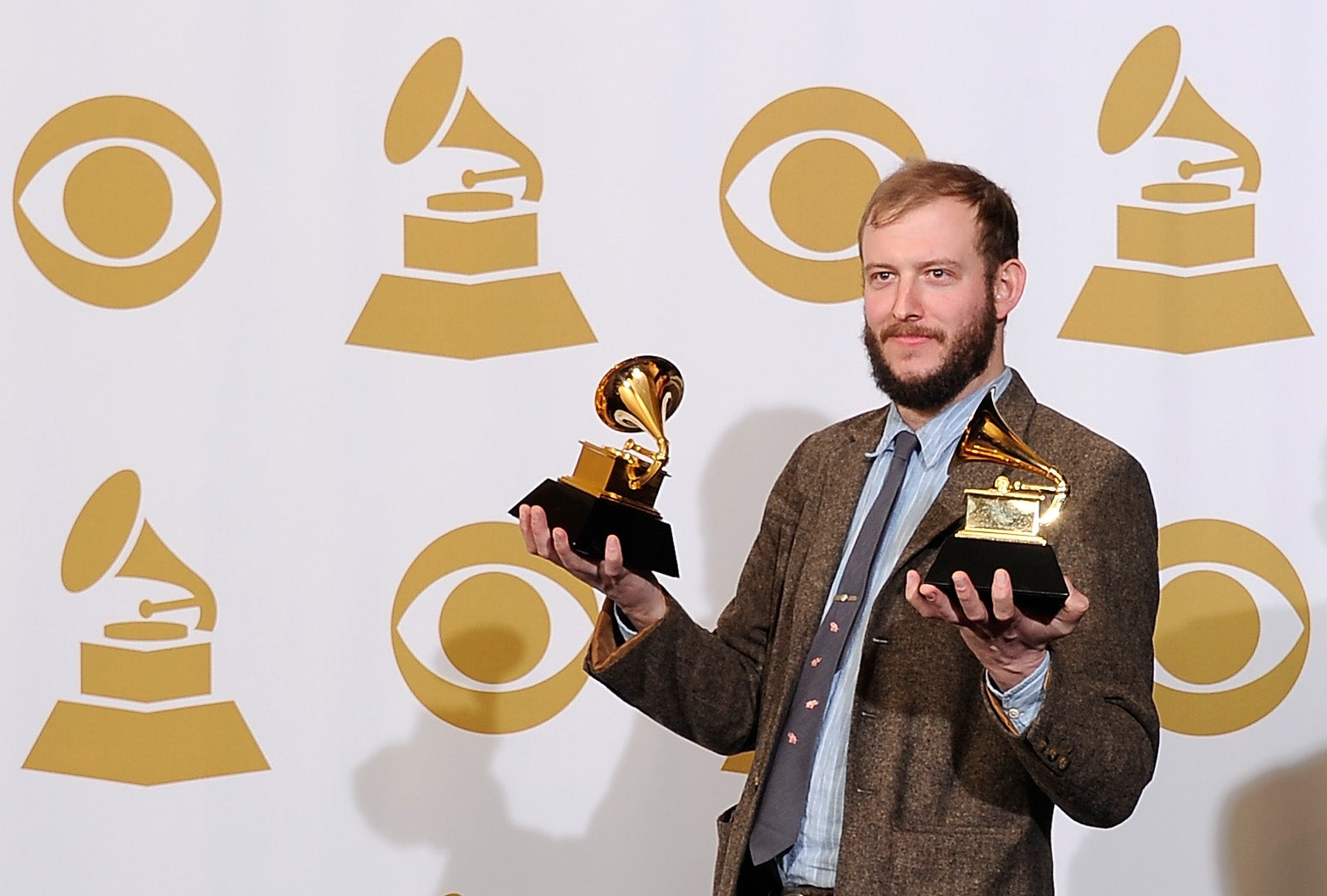‘I would die if he would do it’: Justin Vernon and Taylor Swift – a pop friendship for the ages
The two could hardly be more different, but their continued collaboration over the past few years proves their musical chemistry. Ed Power explores how it took trying something outside her perceived pop ‘lane’ for Swift to come knocking on Vernon’s door

Your support helps us to tell the story
From reproductive rights to climate change to Big Tech, The Independent is on the ground when the story is developing. Whether it's investigating the financials of Elon Musk's pro-Trump PAC or producing our latest documentary, 'The A Word', which shines a light on the American women fighting for reproductive rights, we know how important it is to parse out the facts from the messaging.
At such a critical moment in US history, we need reporters on the ground. Your donation allows us to keep sending journalists to speak to both sides of the story.
The Independent is trusted by Americans across the entire political spectrum. And unlike many other quality news outlets, we choose not to lock Americans out of our reporting and analysis with paywalls. We believe quality journalism should be available to everyone, paid for by those who can afford it.
Your support makes all the difference.Last summer, two young women were swept out to sea and into the vast churning expanse of the Atlantic Ocean. Cousins Ellen Glynn and Sara Feeney had been paddle-boarding off the west coast of Ireland when they were caught by a northerly breeze. Realising they were in jeopardy, they had tied their boards together and clung to a lifebuoy. All they could do was stay afloat and pray someone had noticed their absence.
To keep their spirits high, they sang all the Taylor Swift songs they knew. Out in the dark, the Taylor Swift-Justin Vernon duet “Exile”, a minimalist ballad fuelled by Swift and Vernon’s stormy chemistry, became the spark lighting their way. “I think I’ve seen this film before,” they sang, over and over, all night. “And I didn’t like the end.”
After they had spent 15 hours in the water, a fishing boat materialised in the gloom and carried the pair to safety. Swift, having heard of their ordeal, later sent them a letter and a painting featuring lyrics from “Exile”.
“Exile” is a heartbreaking highlight from Swift’s surprise album Folklore, released in the summer of last year. The track is imprinted with Swift’s steely earnestness. Yet its power flows equally from the enigmatic presence of Vernon, better known by his stage name Bon Iver.
Vernon, who on Friday releases his second Big Red Machine collaboration with The National’s Aaron Dessner, is a master of simple songs containing multitudes. That’s true of “Exile”, which casts Swift and Vernon as the millennial equivalent of Dolly Parton and Kenny Rogers crooning “Islands in the Stream”.
“Exile” is nobody’s idea of feel-good, it is true. It is a bone-bare dirge about lovers who run into each other shortly after their break-up. She has moved on. He has not. However, the misery is offset by its rousing sense of defiance. Swift is incapable of writing a tune that doesn’t make you want to face the world with your chin held a little higher. And Vernon’s voice paints pictures with the expressiveness of a novelist. Together, they make even a sad song glow.
The same magic zings through the new Big Red Machine record, How Long Do You Think It’s Gonna Last?. Swift – who suggested the album title – is back, sharing a mic with Vernon on the wispily haunting “Birch” (their third duet, after “Exile” and the title number from December’s Evermore). She also takes lead vocals on single “Renegade”, recorded the same week in February that Folklore won the album of the year Grammy.
But she is just one of a “who’s who” of collaborators which also includes Devon guitarist wizard Ben Howard, Fleet Foxes’s Robin Pecknold, indie singer Sharon Van Etten and This Is The Kit folkies Lisa Hannigan and Kate Stables.
As guitarist with The National, Dessner is obviously well-practised at crafting big-hearted alternative rock (and, of course, has producer credits on Folklore and Evermore). Nevertheless, the special ingredient in Big Red Machine is surely Vernon, who has cut a consistently quixotic figure since emerging from “indie-dude” obscurity a decade and a half ago.
Enjoy unlimited access to 100 million ad-free songs and podcasts with Amazon Music
Sign up now for a 4 month free trial (3 months for non-Prime members)
Enjoy unlimited access to 100 million ad-free songs and podcasts with Amazon Music
Sign up now for a 4 month free trial (3 months for non-Prime members)

Vernon’s initial incarnation was as “sensitive guy bawling about break-ups”. But from those origins as conventional troubadour in a trucker cap – a sort of early-21st-century Jeff Buckley – his music has turned increasingly complex, bizarre and unpredictable.
Yet even as he has waxed weird, his artistic credibility has soared, along with his commercial appeal. Call it the Radiohead effect. After OK Computer, Thom Yorke’s chuckling troupe seemingly did everything in their power to frighten away casual fans via a series of increasingly discordant releases. The joke was on them: the wonkier their music, the more beloved they became.
As Bon Iver, Vernon has charted the same course. And along the way, he has rubbed many shoulders. In 2009, Kanye West flew Vernon to Hawaii to contribute to My Beautiful Dark Twisted Fantasy (Kanye ended up sampling Bon Iver on “Lost In The World”). Michael Stipe, of REM, sang on Big Red Machine’s 2020 track “No Time For Love Like Now”.
Vernon has also worked on several occasions with Eighties “yacht rock” icon Bruce Hornsby, including on Hornsby’s 2019 album Absolute Zero. And in 2020 he, Bruce Springsteen and Jenny Lewis released a flute-splashed collaboration “AUATC” (“Ate Up All Their Cake”).
That fantastic voyage would have seemed massively far-fetched in July 2007, when Vernon put out his solo debut, For Emma, Forever Ago. This is an album with a story – one that has been told so many times, even Vernon has grown sick of it.

The circumstances in which For Emma came together read like an indie-folk Sally Rooney novel. Vernon, having parted from a long-term girlfriend (not named Emma), spent the winter in a cabin near his hometown of Eau Claire, Wisconsin. Accounts differ as to quite how remote the cabin was and whether he was truly off the grid or slightly to the left of centre of it. Nonetheless, Vernon was alone for several months. And when he returned, it was with a collection of star-crossed dirges that would make his career.
“It’s certainly been a remarkable chapter in my life,” he told me in 2009, between mouthfuls of brunch at his local diner in downtown Eau Claire. “Initially, we pressed up something like 500 copies of the record. Then we started getting good reviews and all of the sudden it took off. The pressings kept selling out. I was overwhelmed with emails. It all happened so fast, I’m still trying to come to terms with it.”
He came across as actively keen to demolish the mythology around the project. “In a way it’s not really about her,” he had added, when asked what “Emma” thought of the LP. “Emma isn’t even her name. We’d stopped dating a long time ago. I suppose you could call her a muse. She inspired the album and the emotions expressed therein. The record was really about me working through feelings that had been building up inside me for a long time.”

Three years later, he cut all ties with his balladeer past via the self-titled Bon Iver. Hooks were at a minimum and the lyrics are almost aggressively oblique. “Jagged vacance, thick with ice/ But I could see for miles, miles, miles,” he crooned on “Holocene”, perhaps the “catchiest” moment. On the accompanying tour, his nine-piece band played tuba, violin and bicycle bell. If the music was not so transportive, it would have played out like a parody of neck-bearded indie bloke self-indulgence.
He was just getting started. Recording 2016’s 22, A Million, Vernon became dissatisfied with what he judged an overly “clean” studio sound on the song “22 (OVER S∞∞N)”. So he and his engineer took a cassette of Neil Young’s Unplugged, pulled out the reel, crumpled it and etched over it with a marker. And then recorded over the vandalised taping– conjuring, in the process, a ghostly “found sound” effect.
Elsewhere, the LP variously suggested Radiohead wandering through a mausoleum. Or Phil Collins trapped in a Black Mirror episode in which he is doomed to spend all eternity inside in the drum fill from “In The Air Tonight”.
It was an astonishing achievement. And yet the darkness lurking in its recesses was all too real. “Being a Wisconsin boy, you get to drinking, you know?” he told Pitchfork. “I was hanging out on the edge of that stuff a little. Maybe over the edge a few times. More than a few times.”
He would, however, go on to conquer his demons. In 2020 he told podcast Tuesdays with Lazerbeak that he had cut back on the booze and cigarettes. But then fans will have already known he was in a happier place having listened to his fourth LP, 2019’s i,i.
If spooky and avant-garde in places i,i was also more accessible than anything he had done since For Emma. There were melodies, choruses, emotional pay-offs. All of which had come gushing through following a sojourn in which he and Dessner had released their 2018 self-titled Big Red Machine debut.
They then parted ways, with The National going on to make another record, 2019’s I Am Easy To Find. But last year, with the world in lockdown, Vernon received an email from Dessner, who was sharing ideas with Swift on what would become Folklore.
But what does Swift bring to the equation? Just as much as Vernon obviously – if not more. By the time she contacted Aaron Dessner with a view to trying something outside her perceived pop “lane”, she had been through a great deal. Bruised by the public backlash against her success and ubiquity – pain she had channelled into 2017’s unflinching Reputation – Swift was an artist growing up in a hurry.
That sense of change was palpable on Reputation, a rumination on fame with acid dripping through its pores, and on the glossy and defiantly sugarspun Lover from 2019. So by the time she started swapping ideas with Dessner – who put her in touch with Vernon – she was ready for something different.
“Different” in this case meant stripping it all back. And writing from a perspective outside the four walls of her own life. With Folklore, Swift was exploring personas and experiences other than her own – and a case can be made that “Exile” is the perfect example of that.
“A lot of this album was kind of distilled down to the purest version of what the story is,” she told Entertainment Weekly. “Songwriting on this album is exactly the way that I would write if I considered nothing else other than, ‘What words do I want to write? What stories do I want to tell? What melodies do I want to sing?’”
Swift had composed “Exile” as a duet – together with her boyfriend Joe Alwyn, credited as William Bowery – and sung both parts on the demo she sent to Dessner. He asked if she had a dream duetting partner and her answer was Vernon.
“We talked about who she was imagining joining her,” Dessner told Billboard, “and she loves Justin’s voice in Bon Iver and Big Red Machine. She was like, ‘Oh my god, I would die if he would do it. It would be so perfect.’ I didn’t want to put pressure on Justin as his friend, so I said, ‘Well, it depends on if he’s inspired by the song but I know he thinks you’re rad.’”
The demo went out to Vernon – and sparks flew. “You feel like, in a weird way, you’re watching two of the greatest songwriters and vocalists of our generation collaborating,” said Dessner. “I was facilitating it and making it happen, and playing all the music. But it was definitely a ‘wow’. I was just a fan at that point, seeing it happen.”
“Exile” – the song those two lost surfer girls clung to as they tried to literally keep their heads above water – is, in a way, the most straightforward piece of music with which Vernon had been associated for years. It still pulsates with a strange beauty – our generation’s “Islands in the Stream”, perhaps, but with that same seam of mystery that time and time again has proved Vernon’s signature.
And it speaks to Vernon’s eagerness to try something different – in this case, working with a global popstar. That desire to reach out to other artists was something he discussed when interviewed about his Volcano Choir side-project in 2014.
“Whether I’m in the studio with [Volcano Choir] or Kanye, you are collaborating with someone who is really f***ing good at something,” he told me.
“You listen to what they say and, if you agree or disagree, you are working to find out what is the best decision for the song.” And if Vernon has a unique talent it might be for making the best decision again and again – whether that be in a song or when choosing another stellar collaborator.
‘How Long Do You Think It’s Gonna Last?’ by Big Red Machine is released on 27 August



Join our commenting forum
Join thought-provoking conversations, follow other Independent readers and see their replies
Comments